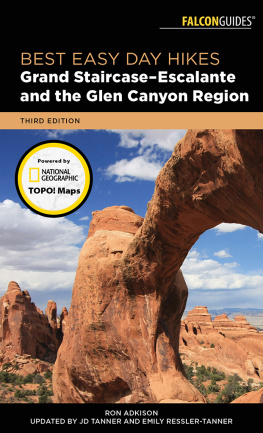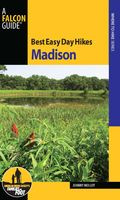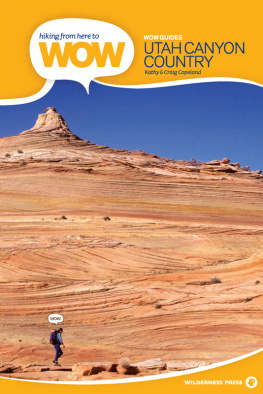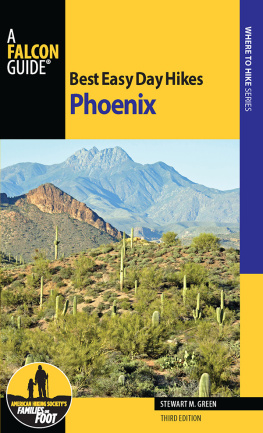Contents
Best Easy Day Hikes
Grand Staircase-Escalante and the
Glen Canyon Region
Help Us Keep This Guide Up to Date
Every effort has been made by the authors and editors to make this guide as accurate and useful as possible. However, many things can change after a guide is publishedtrails are rerouted, regulations change, facilities come under new management, and so forth.
We welcome your comments concerning your experiences with this guide and how you feel it could be improved and kept up to date. While we may not be able to respond to all comments and suggestions, well take them to heart, and well also make certain to share them with the authors. Please send your comments and suggestions to the following address:
Globe Pequot Press
Reader Response/Editorial Department
246 Goose Lane
Guilford, CT 06437
Or you may e-mail us at:
Thanks for your input, and happy trails!
B e s tE a s yD a yH i k e sS e r i e s
Best Easy Day Hikes
Grand Staircase
Escalante and the Glen
Canyon Region
Third Edition
Ron Adkison
Updated by JD and Emily Ressler-Tanner


An imprint of Globe Pequot
Falcon and FalconGuides are registered trademarks and Make Adventure Your Story is a trademark of Rowman & Littlefield.
Distributed by NATIONAL BOOK NETWORK
Copyright 2018 Rowman & Littlefield
A previous edition of this book was published by Falcon Publishing, Inc., in 1998.
TOPO! Maps copyright 2018 National Geographic Partners, LLC. All Rights Reserved.
Maps Rowman & Littlefield
All rights reserved. No part of this book may be reproduced in any form or by any electronic or mechanical means, including information storage and retrieval systems, without written permission from the publisher, except by a reviewer who may quote passages in a review.
British Library Cataloguing-in-Publication Information available
Library of Congress Cataloging-in-Publication Data available
ISBN 978-1-4930-2885-6 (paperback)
ISBN 978-1-4930-2886-3 (e-book)
 The paper used in this publication meets the minimum requirements of American National Standard for Information SciencesPermanence of Paper for Printed Library Materials, ANSI/NISO Z39.48-1992.
The paper used in this publication meets the minimum requirements of American National Standard for Information SciencesPermanence of Paper for Printed Library Materials, ANSI/NISO Z39.48-1992.
Printed in the United States of America
The authors and Rowman & Littlefield assume no liability for accidents happening to, or injuries sustained by, readers who engage in the activities described in this book.
Contents

Introduction
The relatively undiscovered Glen Canyon region, stretching from Cedar Mesa near Blanding, Utah, to the Paria River Canyon near Glen Canyon Dam on the ArizonaUtah border, features hundreds of miles of excellent hiking and canyoneering routes in southern Utah. Within this region, hikers can enjoy outstanding canyon-country landscapes with scenery rivaling that found in Utahs well-known national parks, but without the hordes of hikers that flock to those famous areas.
This handy guidebook, an abridged version of the comprehensive book Hiking Grand StaircaseEscalante and the Glen Canyon Region, is the first book about the Glen Canyon region that meets the needs of day hikers, whether they are a family on vacation or more serious hikers budgeting their time and energy.
The twenty easy hikes in this book survey the spectrum of the Glen Canyon regions landscapes: serpentine canyons and wooded plateaus, arches, natural bridges, Anasazi ruins, and rock art sites. The hikes range from less than a mile to 8 miles, although most are 2 to 3 miles in length. A few of the hikes have steep or sustained grades, though most are gentle with minimal elevation change. Many of the hikes covered in this book are on well-defined, easy-to-follow trails. Only a few are trail less, and those routes follow canyon-bottom washes where route-finding skills are not necessary.
Weather
Hikers come to the Glen Canyon region year-round, but most visit during spring and autumn. Since the region is a desert environment, with daytime high temperatures often reaching 95 to 105 degrees Fahrenheit, June through August, summer is the most unfavorable time of the year to hike in the area.
Spring weather (March through May) can be highly variable, with daytime high temperatures ranging from the 50s to the 70s and nighttime lows ranging from 20 to 50 degrees Fahrenheit. Occasional cold fronts from the west and northwest can bring cold and windy conditions, rain showers in the lower elevations, and perhaps snow on the higher mesas. Generally warm, dry weather prevails between storm systems.
The onset of searing summer heat usually begins in late May and can persist into mid-September. The monsoon season usually begins in mid-July and ends in mid-September. During this time, moist tropical air masses over Mexico circulate an almost daily parade of thunderstorms over the region. Midsummer weather in southern Utah is characterized by torrential rainfall, which is usually accompanied by strong, gusty winds and lightning.
Autumn provides some of the most stable weather of the year. Clear, warm, sunny days and cool nights make this one of the most delightful seasons to visit the Glen Canyon region. Expect daytime highs to range from the 70s and 80s in September to the 40s and 50s by November. Overnight lows are typically in the 20- to 50-degree range. Cold fronts can sweep through the region as autumn progresses, and by mid- to late October in some years, these fronts can drop temperatures significantly for several days or longer. Snowfall in the higher elevations is not uncommon.
Winter in the Glen Canyon region is cold and often windy, and deep snow sometimes covers the ground above 6,000 feet. Cold-weather experience is essential for winter hiking in the region.
Safety and Preparations
All of the areas covered in this book are in wild, very remote country, far removed from enclaves of civilization. You must come prepared to be self-reliant, with a good attitude and ample supplies to deal with unexpected situations.
Hikers should note that hiking in canyon country is more demanding than they might expect. Sandy washes and trails, cairned routes over slickrock, navigating among boulders, rock-hopping, and forging a way through streamside growth go with the territory. Hikers new to canyon-country hiking should take it slow and be careful until they grow accustomed to the rigors of travel here.
All hikers should carry at least two quarts of water per person on half-day hikes and one gallon per person on all-day hikes in hot weather. Avoid hiking in the Glen Canyon region during the hot summer months, but if you must, walk during the early morning and late afternoon hours only.
Always tell someone back home where you will be each day, and in the event you do not contact that person at the end of your trip as planned, make arrangements for him or her to notify the county sheriff in your area of travel. Sheriffs phone numbers are listed for each chapter.
Be aware that road and hiking conditions can change rapidly. Always obtain updated information on your route of travel from the Bureau of Land Management (BLM) offices listed in each chapter. Flash floods can occur suddenly, leaving you stranded in canyons or on rain-slick dirt roads. Always be prepared with extra food, water, and clothing in the event you become stranded, whether in the backcountry or on the road.









 The paper used in this publication meets the minimum requirements of American National Standard for Information SciencesPermanence of Paper for Printed Library Materials, ANSI/NISO Z39.48-1992.
The paper used in this publication meets the minimum requirements of American National Standard for Information SciencesPermanence of Paper for Printed Library Materials, ANSI/NISO Z39.48-1992.